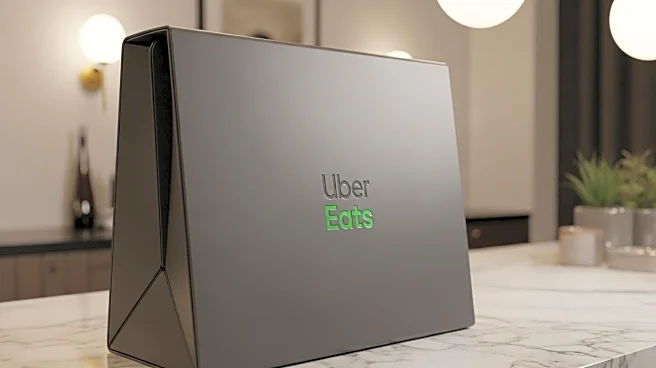What is the story about?
What's Happening?
Jude Law features in a new Uber Eats advertisement, playfully subverting his romcom legacy. The ad follows Law through London, encountering typical 'meet-cute' scenarios, but he chooses not to engage, highlighting the convenience of Uber Eats for relaxation. The campaign, directed by David Shane, builds on previous ads featuring celebrities like Javier Bardem. The integrated campaign launches across TV, digital, and social media, showcasing Uber Eats' role in simplifying downtime and offering a humorous take on Law's iconic roles.
Why It's Important?
The advertisement reflects Uber Eats' strategy to leverage celebrity endorsements to enhance brand visibility and appeal. By featuring Jude Law, the campaign taps into his established romcom persona, creating a relatable and entertaining narrative. This approach can attract a broad audience, increasing engagement and brand recognition. The ad also highlights the growing trend of using humor and celebrity influence in marketing, which can effectively capture consumer attention and drive sales. As competition in the food delivery market intensifies, innovative campaigns like this are crucial for maintaining a competitive edge.
What's Next?
Uber Eats is likely to continue leveraging celebrity endorsements in future campaigns, building on the success of this ad. The company may explore collaborations with other well-known figures to maintain consumer interest and expand its market reach. The campaign's humorous approach could inspire similar strategies in the industry, encouraging brands to use entertainment and relatability to connect with audiences. As the food delivery market evolves, companies will need to innovate continuously to stand out and attract customers.
Beyond the Headlines
The use of celebrity endorsements in advertising raises questions about the impact of fame on consumer behavior. While celebrities can enhance brand appeal, their influence may also overshadow the product itself. This dynamic highlights the importance of balancing star power with effective messaging. Additionally, the campaign reflects broader trends in marketing, where humor and relatability are increasingly used to engage consumers. As brands navigate these strategies, they must consider the long-term implications for brand identity and consumer loyalty.

















